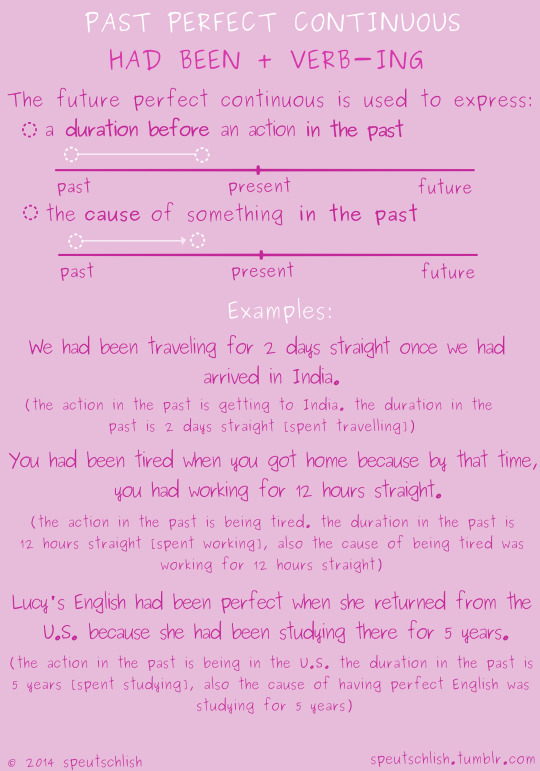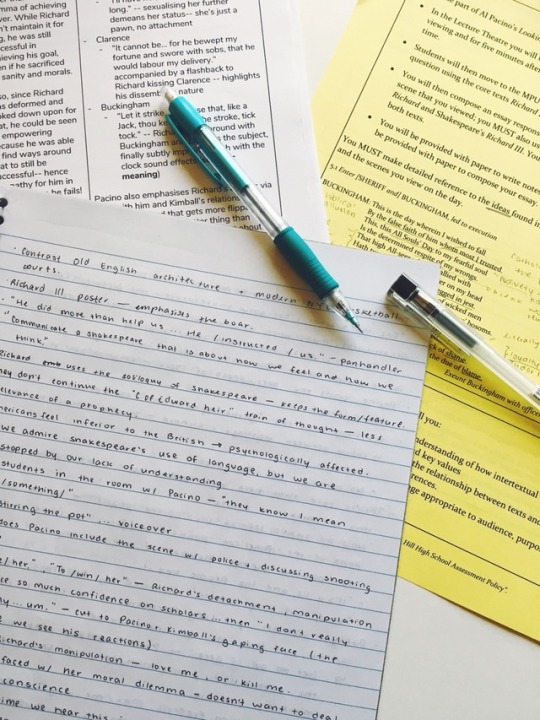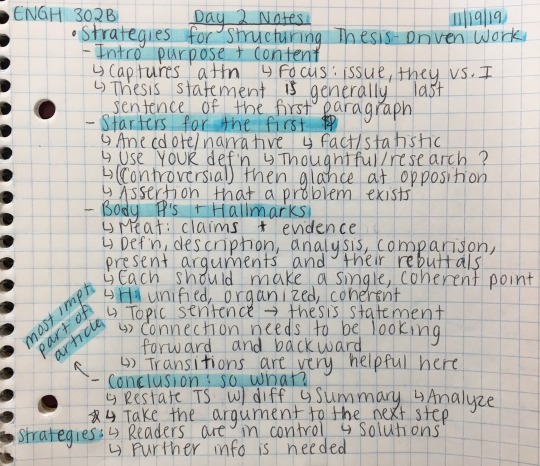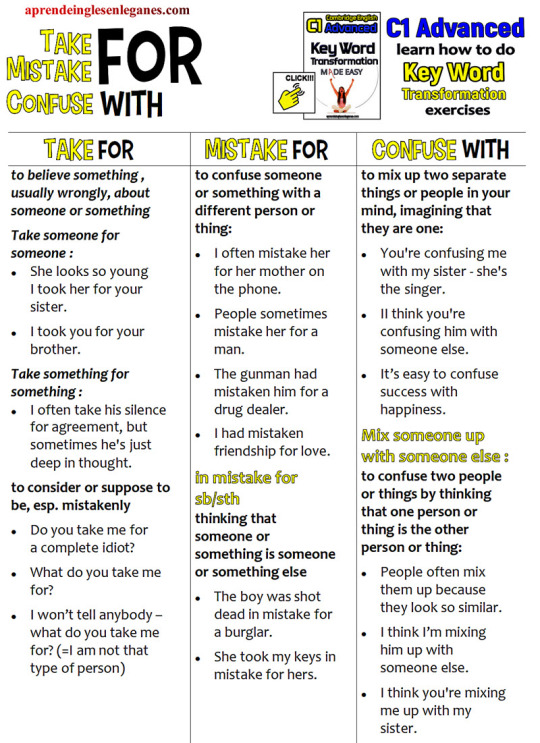#advanced English
Explore tagged Tumblr posts
Text
Random Advanced English Vocabulary
Lode [noun]: a layer of metal in its natural form as ore in the ground
Pimp [noun]: a man who controls prostitutes, especially by finding customers for them, and takes some of the money that they earn
To squander [verb]: to waste money or supplies, or to waste opportunities by not using them to your advantage
To stir [verb]: to mix a liquid or other substance by moving an object such as a spoon in a circular pattern
To sow [verb]: to put seeds in or on the ground so that plants will grow
Gallows [noun]: a wooden structure used, especially in the past, to hang criminals from as a form of execution
Quilt [noun]: a decorative cover for a bed
Lavish [adjective]: large in quantity and expensive or impressive
Tithe [noun]: a tenth part of someone's produce or income that they give or pay as a tax to the Church
Hovel [noun]: a small home that is dirty and in bad condition
Sybaritic [adjective]: loving or involving expensive things and pleasure
Shredder [noun]: a tool or machine that is used for cutting things into very small pieces
Sheepish [adjective]: embarrassed because you know that you have done something wrong or silly
Mothball [noun]: a small, white ball containing a chemical with a strong smell that keeps moths away from clothes
To sag [verb]: to drop down to a lower level in the middle Wiseacre To jot [verb]: to make a quick short note of something To jab [verb]: to push or hit something forcefully and quickly, often with a thin or sharp object
To grind [verb]: to make something into small pieces or a powder by pressing between hard surfaces Demure [adjective]: quiet and well behaved To scowl [verb]: to look at someone or something with a very annoyed expression
Quagmire [noun]: an area of soft, wet ground that you sink into if you try to walk on it
Scrawny [adjective]: unpleasantly thin, often with bones showing
#english#vocabulary#vocab#vocabulary list#advanced english#C2 english#english vocabulary#learning english#learning languages#language learning#langblr#languages#polyglot#multilingual#studyblr
811 notes
·
View notes
Text
Advanced English Vocab II
Words:
atone (v): to make amends, compensate
belligerent (adj but can also be used as a noun): warlike, aggressively hostile, eager to fight
congenial (adj): having the same or similar interests, personality, habits etc
curtail (v): to shorten or abridge the duration of something. to restrict or keep in check.
exacerbate (v): to make worse
gregarious (adj): describing someone who likes to be in crowds, socialize etc.
insatiable (adj): incapable of being satisfied or appeased (in thirst or desire).
oblique (adj): not perpendicular, not straightforward, indirect, obscure
plethora (n): large amount of something, excessive or abundance of something
postulate (v): to assume something as truthful, especially as a basis for an argument.
#learning languages#langblr#advanced english vocab#advanced english vocabulary#advanced english#vocab list#language learner
416 notes
·
View notes
Text
Advanced English: some of my favourite English words
1. querulous (adj)
Complaining in a whining or petulant manner.
Although they tackled the task with enthusiasm at first, they became querulous as the day wore on.
The children were mercilessly querulous, which made the journey all the more unbearable.
2. sobriquet (noun)
A nickname or alternate name (usually given by others) that is descriptive in nature, which can apply to people, places and events.
The Viper wasn’t a sobriquet he’d chosen for himself, but he couldn’t deny it was fitting.
She’d taken offence at the sobriquet at first, but now it was the only name she’d answer to.
3. obsequious (adj)
Fawning, servile; characterised by exhibiting fawning attentiveness.
The queen was attended by a number of obsequious servants
I like working for the company, but my colleagues are so obsequious towards our boss!
4. opalescent (adj)
Exhibiting a display of colours like that of an opal.
In the centre of the necklace was a mysterious stone that rippled with opalescent hues.
The elven warriors arrived, looking resplendent in their opalescent armour.
5. lambent (adj)
(Of light) softly radiant, flickering; lightly brushing over a surface | (Of wit) expressing brightness or brilliance without being unkind
The lambent light of the dying campfire cast eerie shadows across his face.
Her natural charisma and lambent wit made her a popular person.
170 notes
·
View notes
Note
Do you have any resources for advanced English?
Top 5:
Literature: The Norton Anthology of English Literature
Grammar: Advanced Grammar in Use: A self-study reference and practice book for advanced students of English (with answers), 2nd Ed. by Martin Hewings, ISBN 9780521532914
Grammar: The Most Common Errors in English Usage and How to Avoid Them: Learn How to Control Grammar Rather Than Letting It Control You by Elaine Bender, ISBN 9780760741375
Writing: Writing with Style: Conversations on the Art of Writing by John R. Trimble, 3rd Ed., ISBN 9780205028801
Listening: Patton Oswalt’s Werewolves and Lollipops, Bo Burnham’s what. & the entire MST3K series
161 notes
·
View notes
Text
Some Advanced English Vocabulary
Aberration /ˌæb əˈreɪ ʃən/ [ab-uh-rey-shuh n] (n.)
Something that differs from the norm.
“That attack is looking disturbingly more like a sign of things to come than an aberration.”
Related Forms: aberrational (adj.)
Forsake /fɔrˈseɪk/ [fawr-seyk] (v.)
To quit or leave entirely, abandon, or desert.
“Your greed, your willingness to forsake every value people cherish in your pursuit of the almighty dollar is without parallel.”
Related Forms: forsaker (n.), unforsaking (adj.)
Infamy /ˈɪn fə mi/ [in-fuh-mee] (n.)
Notoriety, extreme ill repute.
“A day that will live in infamy.” Franklin Delano Roosevelt, 32nd President of the United States, in a speech given after the attack on Pearl Harbor.
Related Forms: Infamous (n.)
#english#advanced english#english vocabulary#advanced english vocabulary#turtlelanguages#vocabulary#language learning#langblr
93 notes
·
View notes
Photo


Past and future perfect continuous to round out the mastergraphic of English verb tenses.
I feel like I need to put some warning on here for English learners who aren't at this point yet - this is really complex stuff that native speakers don't always use perfectly, so don't get discouraged if you see this and think that you'll never be able to learn it! Little by little, you'll get there.
77 notes
·
View notes
Photo

11/3/17 || "But if we felt what we said, we'd say less and mean more." Casually having an existential crisis about how Richard III could be viewed as a successful person in modern context 🙃
#studyblr#studyspo#hsc 2017#hsc english#advanced english#shakespeare#looking for richard#richard iii#lake's adventures in life
59 notes
·
View notes
Text
Advanced English Vocabulary
hey uh here’s some english words i’ve found and have been learning. thought i’d share them with y’all. definitions taken/paraphrased from dictionary.com
hoary - adj. grey or white with age; ancient; tedious from familiarity
opprobrium - n. disgrace from behavior considered extremely shameful; infamy
nadir - n. lowest point, point of greatest adversity or despair (also an astronomy term meaning point on a celestial sphere that is directly below the observer or given position)
zenith - n. highest point; point of greatest success (also an astronomy term meaning point on a celestial sphere that is directly above the observer or given position)
dearth - n. inadequate supply; scarcity
zephyr - n. mild, soft breeze
cislunar - adj. distance between the earth and the moon
traipse - v. transitive: to walk over; trample. intransitive: to walk aimlessly or without reaching one’s goal
banal - adj. unoriginal and devoid of freshness
dogmatic - adj. relating to any strong set of principles laid down by a church; asserting opinions in an arrogant manner
fastidious - adj. excessively critical or demanding; hard to please
inimical - adj. unfavorable or harmful
ascetic - n. person who leads a very simple life, esp. someone who abstains from the usual pleasures of life or denies themself material satisfaction
(maybe not all of these words are like…everyday useful esp the astronomy ones but hey, the more words you know the better right?)
#english#english langblr#langblr#language#advanced english#studyblr#this is my first vocab post and it's about english. sigh#i'm planning on maybe making spanish and mandarin ones though#a basic cantonese vocab list?#i expect zero notes idk why i'm even posting this i just want to contribute to langblr bc it has helped me a lot#my posts
58 notes
·
View notes
Text
Why every English learner should study root words

If there’s one thing that almost every English student, regardless of level, struggles with, it’s how to improve their English comprehension.
During my time as an English teacher, I’ve noticed a pretty common problem arising among students when it comes time for them to read –
“What am I supposed to do when I come across a word that I don’t understand?”
This is a notoriously challenging situation that has happened more than once in our recent English conversation classes, especially since we’re reading an upper-intermediate level book right now.
It’s a perfectly reasonable question – After all, English incorporates vocabulary from multiple languages, and many words can have a variety of meanings. Learning it all is a huge challenge!
And, it can be made even more difficult if you don’t have your confidence built up from practice.
Consider this – Do you believe that every English speaker knows every single word we read or hear, especially in the higher-difficulty books and conversations?
Of course not! I’m an English teacher, and I frequently come across completely new words when reading. So, how do we understand what’s actually being said?
Root words!

A root word is the most basic part of a word, which can have prefixes and suffixes added on to create new words.
Root words are used as a basis for the majority of English words – So, if you know the root words meaning, you can also begin to understand the general meaning of the overall word.
In other words – If you can memorize the definition of 30 root words, you’ll now understand the 300+ English words they are used in. Think of how quickly you will be able to improve your English comprehension if you have access to all this new vocabulary.
Root words come from Latin and Greek, and are generally very short, so they should be pretty simple to remember!
Let’s take a look at some examples:
In the word Astrology, the root would be “Astro” – It originates from Greek, and means “star”.
If we know “Astro” means star, we automatically know the definition of “Astrology” is related to stars.
And, we know the suffix “logy” means “the study of”. Put it together, and what do we have?
Do you see how this might be able to help you? You could be reading an English book, and come across the word “Astrology” – Even if you’ve never seen the word before, if you understand the meaning of the root “Astro”, you can automatically determine what the word means without the use of a dictionary.

Here, let’s take a look at another example – The root word “Bene” (pronounced “beh-neh”)
This root word is used for longer words, including “Benevolent”, “Benefactor” “Benevolence” “Benign”, “Benediction”, and at least ten others.
Maybe you don’t have any idea what all of these words mean – They’re not super common, and they’re pretty complex.
But, you can see the root word of “Bene” in all of them, right?
So if you understand what “Bene” means, you can also understand the general definition of all of these words, without studying them individually. If they’re in a sentence, you can probably figure out what they mean based on the context and root word alone.
Definition: “Bene” means Good.
Think about these sentences, and how you can use the root word and context in them to understand the meaning.
The benefactor decided to remain anonymous after his large donation to the hospital.
Benefactor: Someone who helps another person/group – Someone good.
The cancerous tumor was benign – It wasn’t as big of a danger as we thought.
Benign: Something harmless.
Our king was a kind man – His charity demonstrated his benevolence.
Benevolence: A desire to do good, or to be a good person.
Is this starting to make sense? Do you see how this might improve your English comprehension?
One more exercise…
I’m going to write a pretty difficult, advanced-level English paragraph. Using the list of root words provided below, try and see if you can understand the general meaning of the paragraph WITHOUT using a dictionary.

Root words:
Cred = believe
Tele = far away
Cardio = heart
Derm = skin
Mal = bad
Micro = small
Using these root word definitions, the paragraph means something like this:
It was hard to believe the phone salesman (who is far away) – His claims of the device being able to improve the heart and skin health of users was crazy. After all, what would happen if it didn’t work / worked badly, or caused some small damage to my body that I wouldn’t be able to see?
So, how do we study root words?
To study root words, just use the same method you use to study normal vocabulary! If you want to take it up a level, put a few example words using the root word on your flashcards with the definition. You could have something like this…
Learning root words is way more efficient than studying every English word on their own, and is a very quick method of improving your comprehension. I STRONGLY recommend that every English learner give this a try!
Just spend 30 minutes a day studying these root words, and in a few weeks you’ll have 50+ root words memorized.
Assuming every root word is used in ten English words, you now understand the general meaning of 500+ English words without studying any of them on their own!
Give this method a shot and see how much easier reading and listening become! If you’re interested, try signing up for our monthly English lesson plan to practice what you learn!
For a full list of English root words, use this website – And if you want to just study the most popular root words, I suggest you go here.
And, read the full article here!
#english learning#advanced english#intermediate english#english vocabulary#learn english#english tips
40 notes
·
View notes
Text



Advertising and very rare English notes
No detailed caption because I’m tired - but I hope you’re all having a lovely week!
40 notes
·
View notes
Text
Advanced English: some of my favourite English words (2/?)
1. mendacious (adj)
dishonest, diverging from the truth (implying something habitual and intentional)
She liked to tell mendacious stories of her nights on the town.
The leader of this country is a mendacious racist.
2. loquacious (adj)
excessively talkative (with fluency and eloquence)
Being loquacious as he was, there was never an awkward silence when he was in the room.
Though she was normally quite loquacious, that stupid boy with his beautiful eyes turned her brains to jelly, and she couldn’t think of a single word to say to him.
3. diatribe (noun)
a bitter and abusive attack or criticism, denunciation
Her soft words cut through her uncle’s diatribe.
The article was a vicious diatribe against the new immigration policy.
4. farrago (noun)
a confused mixture
The film was a plotless farrago of aliens, zombie vikings and medieval knights.
Her workshop contained a farrago of odds and ends, from brightly-coloured scraps of fabrics to bicycle wheels to seemingly broken musical instruments.
5. soporific (adj)
inducing sleepiness or drowsiness
The warmth of the open fire, combined with my full belly, was powerfully soporific.
The lecture content would have been soporific enough without the professor’s dreary delivery.
117 notes
·
View notes
Photo

YOU CAN DOWNLOAD THIS SHEET IN PDF FORMAT HERE : https://www.aprendeinglesenleganes.com/take-for---mistake-for.php TAKE FOR, MISTAKE FOR, CONFUSE WITH Confused? Mistaken? Taken for someone else? Let's unravel the mysteries of mixed identities! In today's post, we'll explore the fascinating world of "take for," "mistake for," and "confuse with." Join us on this linguistic adventure!
NOTE : These three verbs may come up in the key word transformation part (use of English part 4) of the B2 First and C1 Advanced exams.
#b2 first#fce exam#c1 advanced#cae exam#advanced english#english grammar#IELTS#TOEIC#TOEFL#els#cambridge english#use of english part 4#english teacher#english tips#english lessons#grammar tips#inglese per italiani#apprendre l'anglais#gramática inglesa#english infographic#englische grammatik
33 notes
·
View notes
Photo

29th SEPTEMBER // 2:07pm I'm at a workshop for English today, and I printed off all my notes last night to review while I'm here!
27 notes
·
View notes
Text
FUCK BELONGING,
FUCK MODULES A, B AND C.
FUCK EVERYTHING.
FUCK THE HSC.
I HATE YOU.
20 notes
·
View notes
Text
Advanced English: some of my favourite English words (3/?)
1. temerity (noun)
boldness, audacity, rashness, recklessness
Though her temerity made her difficult to work with at times, it had its merits too.
No one had the temerity to call out his arrogance.
2. rapacious (adj)
aggressively greedy or covetous, having a strong desire to take things for oneself (usually by unfair methods)
Businessmen often have a rapacious streak, which is what makes them so successful.
She was a rapacious child; if she couldn’t bully the other children into giving her their toys, she’d simply take them.
3. garrulous (adj)
excessively talkative (particularly on trivial matters)
He wondered if the garrulous old man would ever shut up.
Her garrulous nature made her a poor dinner guest.
4. gamine (adj/noun)
(of a girl) attractively boyish / a thin woman with short hair who is perceived to be playfully mischievous
The photo depicted a gamine young woman, with short, tousled hair and a mischievous smile
The heroines of the story are a Scottish gamine and her femme fatale partner.
5. susurrus (noun)
rustling or whispering sound
Walking through the forest was calming; nothing soothed her more than the susurrus of leaves in the wind.
Close by he could hear the susurrus of a stream.
75 notes
·
View notes